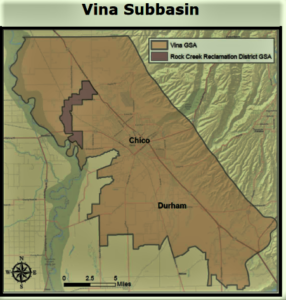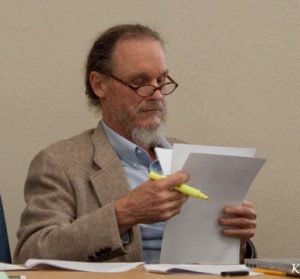by Natalie Hanson & Leslie Layton
posted July 1
Chico-area property owners have through July 26 to reject a proposed new fee for groundwater management that will otherwise appear on their December tax bills.
The annual per-acre fee would fund and implement a new groundwater management plan for the area known as the Vina Subbasin. That subbasin, which holds a significant portion of Butte County’s water, stretches from the Durham area northward to the Butte County line and includes Chico.

The fee will appear on property tax bills if it’s not rejected in what’s called a “protest election” underway now. Property owners who are opposed can send a written protest by July 26 to Vina Subbasin Groundwater Sustainability Agency (see address at end of story) or voice their objection at a public hearing that day.
Tod Kimmelshue, who represents the Butte County Board of Supervisors on the Vina Groundwater Sustainability Agency (GSA) board said the levy will help fund the state-mandated groundwater management plan.
But the groundwater sustainability plan isn’t without controversy; opponents say the tax subsidizes large groundwater users and the plan it would fund, as designed, will lead to more overpumping in the basin.
Some small-parcel owners may not initially even notice the fee, but for other people it will be a “significant burden,” said water policy analyst Jim Brobeck, who works with the regional watchdog nonprofit AquAlliance. For example, owners of large-parcel grazing lands will pay a substantial tax even if they aren’t using groundwater.
All California subbasins must be under the purview of a regional GSA body, and the Vina subbasin is thus managed by the Vina GSA. Under the state’s 2014 Sustainable Groundwater Management Act, the GSAs must approve long-term plans to manage groundwater pumping and bring basins into balanced conditions by 2040.
The Vina GSA wants to impose a fee of up to $3.09 per acre. The actual amount of the fee, which may be less than the maximum, will be set by a resolution of the board.
Under the state Constitution, owners of land subject to the proposed fee have the right to protest its adoption, but this particular election would require some 17,000 protests for fee rejection. The protest election now underway culminates in a July 26 public hearing.

Kimmelshue, in a telephone interview, noted that the Vina GSA’s plan is under review by the state, which has two years to approve it. He thinks that some revision may be needed.
Brobeck notes that the Vina GSA is free to implement projects while its plan is under state review.
Chico resident Emily Alma called the tax “undemocratic” because it is based on acreage a person owns. She said both City residents and people who live on larger rural lots are frustrated because the tax will impact people who don’t irrigate, not just those who pump underground aquifers.
People with shallow domestic wells that are among the many that ran dry during two years of drought will still have to pay a tax, Alma pointed out. And she argues that the plan allows for so much groundwater to be pumped that the water table could drop below the necessary levels to reach regional valley oaks.
The Vina GSA plan says, in the executive summary, that it addresses “overdraft and related conditions” and has “identified 15 projects for potential development that either replace groundwater use (offset) or supplement groundwater supplies (recharge) to meet current and future water demands.”
Brobeck says the plan proposes an “operating range” for the water table that alarms him; that what’s known as “artificial recharge” in fact requires that aquifer levels be dropped substantially to create storage space.
“Those of us who think that the Vina plan is actually going to destroy the water table are very upset that we’re being charged to administer the Vina plan,” Brobeck said.

water policy analyst Jim Brobeck
AquAlliance is suing the GSA over management of the Vina water district. The organization said in comments submitted to the state in spring 2022 that the GSA’s plan contains “serious flaws” that require changes.
AquAlliance believes the GSA’s plan will enable more overpumping of already strained groundwater basins for agricultural purposes.
“This is the only opportunity for the impacted public in the Vina Subbasin to stop the depletion and takeover of groundwater,” said AquAlliance Executive Director Barbara Vlamis.
“No matter how low most property owners’ fees are due to their small-parcel acreage, they need to know the so-called Groundwater Sustainability Plan is so bad it is in court …,” she said. “This subsidy to large groundwater pumpers will harm the basin and lead to the takeover of it by entities interested in water marketing … not protecting the health of the streams, trees, small businesses, ranches, and homes.”
Vlamis warned that “once water marketing kicks in and artificial recharge projects start” landowners will lose control over their supplies over time.
Kimmelshue, an agricultural landowner who is himself impacted by the planned fee, commented on the disputable fairness of the tax. He said he wanted different levies for irrigated and non-irrigated land since the Vina area contains both. However, his suggestion didn’t garner enough GSA board votes.
“The bottom line is that the orchards are much more profitable than the rangeland folk on a per-acre basis,” he said. “It (the tax) definitely penalizes those that are non-irrigated more than irrigator folks.”
Kimmelshue indicated there have been opportunities previously for protests.
“We were rolling along making the decision with no protests,” he said. “And once they find out there’s this fee levied on everybody’s property, they come protesting. I’m not blaming anybody, but this is part of the public process. This is a perfect example of when people do not show up and take part in the public process.”
But Alma said many people have been showing up to voice their opposition at meetings. A June 14 public workshop on the topic was “throbbing” with people who were angry and upset, Alma said.
“Not one person was supportive of it,” she said. “They (elected leaders) did not listen to our concerns.”
Alma is also concerned that many people are unaware of the protest election and may not be receiving the mailed information about it, or may not recognize the Vina GSA mailers as important and time-sensitive.
Butte County Water and Resource Conservation Department Director Kamie Loeser noted that a protest opportunity is not a special election. Loeser said about 50% of landowners within the basin boundaries must submit a protest ballot against approving the tax — or about 17,000 people. Otherwise, the proposed tax will be approved to start funding the GSA program as planned.
The Vina GSA public hearing will be held at 5:30 p.m. July 26 at Chico City Council Chambers. The GSA board will likely approve the fee then, unless sufficient protest ballots get collected.
Landowners who want to protest the tax can send a written protest before July 26 to Vina Subbasin Groundwater Sustainability Agency, c/o Vina GSA, P.O Box 7211, Chico, CA 95927. They can also protest in person before the end of the public hearing.
Those with questions can contact the Vina GSA at (530) 552-3592 or vinagsa@gmail.com.
Natalie Hanson is a contributing writer to ChicoSol. Leslie Layton is ChicoSol editor.

we received our notice two days before the “informational” meeting and were unable to attend. We weren’t too motivated to attend anyway – the Elks Lodge? A huge building with poor sound. We called and emailed specific questions, such as, why are we receiving this notice when we don’t have a well and are customers of Cal Water? We have yet to receive any sort of response to either calls or emails. We sent in our protest and hope the rest of you will do same. This is nothing but a salary grab made by a shadowy group, it’s a TAKING.
Id also like to say thanks to you for posting this story, very well written, and thanks to j-Bro and Barbara Vlamis and the staffers at Aqua alliance.
Thanks for the heads up.
Just a real ‘heads up’ this effects everyone, not just Chico residents. They are pushing for this in all areas. The Wyandotte Creek GSA meeting is July 27, 2023 2 p.m. at Oroville City Council Chambers, 1735 Montgomery St, Oroville, CA 95965. The various GSA’s have until 2040 to come up with a plan. Hopefully everyone will send in a protest ballot.
Thank you so much to ChicoSol for covering this critical local issue which main stream media has so far pretty much ignored.
There were comments from Kimmelshue that people should speak up if they’re not happy about what decisions are being made about our groundwater. I attended a meeting several months ago sponsored by Vina GSA which was the opportunity for people to weigh in. (at the Masonic family Center, not the Elks Lodge by the way) There were many many many objections to the plan that they presented yet that plan was what they already had in mind. They were not listening to local concerns nor the concerns underlying the AquAlliance lawsuit.
The Vina GSA plan for our groundwater is based on faulty and unproven science. It’s threatens our Valley Oak Woodlands , and the shallow aquifer on which domestic well users depend.
Thank you for the informative and important discussion.